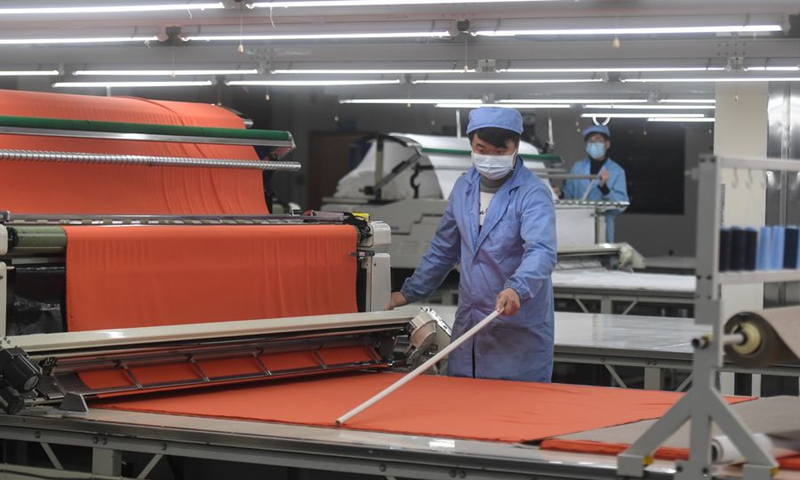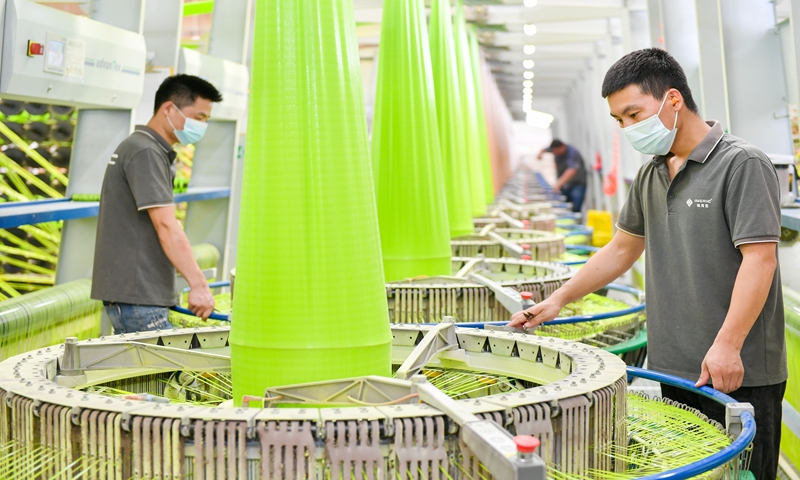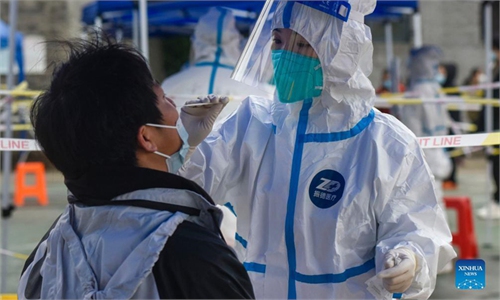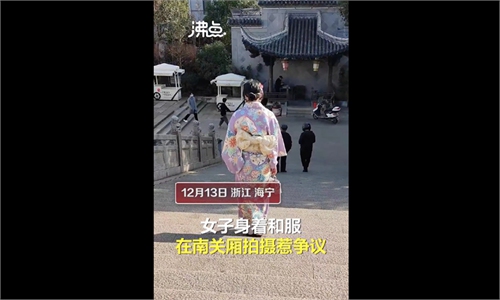Clothing companies in Zhejiang face delivery, production and supply headaches amid COVID-19 outbreak; China's entire clothing supply chain stable
Officials scramble to contain latest virus outbreak in Zhejiang

Workers are seen at a factory in Ningbo, east China's Zhejiang Province. File photo: Xinhua
The recent flare-up of coronavirus infections in East China's Zhejiang Province, which prompted local governments to implement travel and production restrictions, has created headaches ranging from cut-off logistics to interrupted production for local fabrics and clothing companies, leading many business owners to be seriously worried about their business prospects, insiders told the Global Times.The recent wave of infections in Zhejiang began around December 5 and is concentrated in three regions across the province, Shangyu in Shaoxing city, Xiaoshan in Hangzhou city and Zhenhai in Ningbo city. As of 6 pm on Saturday, Shaoxing had reported 358 coronavirus cases. Ningbo reported 74 cases, and Hangzhou reported 29 cases.
In the wake of the latest breakout, local governments have implemented restrictions targeting industrial production and transportation within the three urban districts. Starting from December 8, Shangyu district required local companies to suspend production, except for firms producing PPE or other essential products. Officials also took restrictive measures on intercity transportation in Zhejiang such as closing a number of highway toll stations and suspending packages delivery.
The restrictive measures have disrupted the business of many fabric and clothing companies in Shaoxing, as the halting of production in Shangyu, which is a hub for fabric dye firms that supply local upstream merchants, heaping supply pressure on local clothing or fabrics companies, while causing a number of challenges including logistics bottlenecks and tight production deadlines.
Businesses temporarily disrupted
Two leading dye companies in Shangyu - Lonsen and Zhejiang Runtu Co - both announced the staged suspension of production in response to new local government measures.
Lonsen said that the move would have negative consequence for the company's business operations in December, adding that the impact on their overall performance would be limited.
Ni Jiahao, president of Shaoxing-based Weifeng Fabrics Co, told the Global Times that some of his non-local clients were, for the time being, unwilling to travel to Shaoxing to inspect their ordered goods, creating anxiety across the business. Usually, goods can be delivered after the inspection.
"So far, they have not said explicitly whether they will do the inspection after the coronavirus subsides, or they will just cancel the orders. I think the consequences are hard to imagine," he told the Global Times on Friday.
According to Ni, another byproduct of the recent wave of coronavirus is the unscheduled scaling back of local production, even if local firms do not shut down fully.
"Our factory, which is located in Shaoxing's Keqiao, has halted production on three occasions during the recent wave of coronavirus, each time for half a day or one day. Some of our suppliers in other parts of Shaoxing are also in the same situation, which has affected the entire supply chain to some extent," Ni said.
Jin Xiaobo, CEO of Zhejiang Kaierhai Textile Garments Co, which is based in Shaoxing, told the Global Times that travel restrictions in Zhejiang makes delivery very inconvenient, as he needs to ship products through the nearby Ningbo-Zhoushan Port to overseas clients, but currently drivers are reluctant to pick up products and travel to Ningbo on fear of being embroiled in stricter travel restrictions which may keep them off the road.
"I think the logistics problems are not only faced by clothing companies, but by all industries that depend heavily on Ningbo port for products delivery," he said, adding that he feels quite helpless with no clear solution to the current dilemma.

Employees work on a high-speed circular weaving machine assembly line at a workshop in Changxing Economic and Technological Development Zone in Huzhou, East China's Zhejiang Province, on June 18, 2020. Photo: VCG
Supply chain remains stable
However, the impact of recent coronavirus crisis on China's clothing industry is only restricted to Zhejiang and that the country's entire clothing supply chains remain stable, merchants and industry insiders say.
"The supply chains in Shangyu only account for a tiny production of the entire clothing industry in China," Ouyang Hongjing, a general manager for a fabrics maker Suzhou Jingzhi Textile Technology Co, told the Global Times on Friday.
His company has felt some small ripple effect during the recent coronavirus flare-up, as some of his Ningbo clients have chosen not to ship products through Ningbo port for fear of prolonged customs clearance time, but overall the impact is limited, he said.
Chen Jing, vice president of the Technology and Strategy Research Institute, also said that the recent wave of coronavirus cases would not affect China's "overall situation" in the fabrics and clothing industry, as Zhejiang's clothing and fabrics production capacity only accounts for less than one third of China's entire clothing production, which is scattered throughout East China's Jiangsu Province and South China's Guangdong Province.
"China's clothing and fabrics production has stood up quite well, while the coordination and order transfer abilities between different regions are relatively kept strong," he told the Global Times.
Chen also said that as China has repeatedly showed that it is able to suppress coronavirus flare-ups quickly after regional outbreaks, and global companies will likely give their Chinese clothing suppliers some "flexibility" in dealing with orders.




